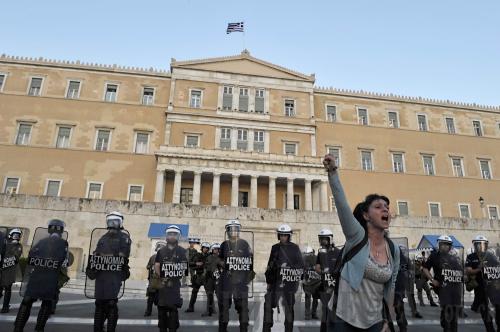|
The euro takes the strain
 |
|
SAYING NO: A protestor demonstrates in front of Parliament House in Athens on May 6. Tens of thousands of Greeks took to the street that day to protest the parliament's adoption of austerity measures in the wake of Greece's sovereign debt crisis (XINHUA/AFP) |
Many warned from the beginning that the euro zone was at risk from fundamental fault lines and lacked the means to control the problems that would ultimately determine the viability of the currency union. These long-standing critics see the current situation as validating their view that the euro zone's member states represent such disparate economies and problems that they can never be managed into a viable monetary union.
Recent events have also distressed many supporters of the euro for whom the debt problem reveals not the impossibility of the union but how badly politicians and the administration have failed to apply the rules and failed the people of Europe. The authorities should have been monitoring developments and controlling the situation before it was too late. Almost certainly there was no need for this crisis: Greece could have benefited from a robust and a sustainable economic performance over the last decade within the euro zone had its debt been kept under control. Now ordinary taxpayers across Europe will have to foot the bill for the debt crisis while Greece will suffer a steep recession.
As the potential scale of the debt crisis has risen so, too, has the cost for those countries expected to provide the financial assistance. Engaging in a growing euro zone bailout may even raise the specter of contagion to Germany's public debt and bond market, although there would be some way to go before this became a serious threat.
The effective transfer of the debt burden from countries near default to more credit-worthy economies, such as Germany and France, might threaten to create negative impacts on the senior bond markets. Certainly a periphery debt crisis could not have come at a worse time, as practically all the euro zone states, including Germany and France, are already struggling to rein in high and rising public debt, the legacy of the global recession.
While the risk of a sovereign debt crisis is casting a dark shadow over growth prospects, the drop in the euro is less of a threat to Europe. In fact, this is providing a timely boost for Europe's exports as competitiveness against the United States and Asia has improved. Ironically, as long as the global economy continues to recover strongly, Germany may stand to gain as much from the added rise in exports (due to the drop in the euro) as it will pay out in assistance to Greece under the May 2 deal (8.4 billion euros now and 22.4 billion euros over three years).
It should also be remembered that the "equilibrium" range for the dollar/euro rate has typically been estimated to be 1.20-1.30, so the present level of the euro is really not particularly weak. It could go much lower, as it did when the dollar/euro rate dipped below parity in 2001. Talk of a weaker euro must be taken seriously as the euro zone looks likely to see persistently weak internal growth as it attempts to make large fiscal adjustments. In contrast, the U.S. economy is already seeing a fairly robust recovery, which will make fiscal cuts easier to undertake over the coming year.
A crisis of confidence
The Greek debt problem is bad enough on its own, with more than 350 billion euros in public sector debt at risk, in Greece and abroad. But adding to the threat of a widespread euro zone crisis are the repercussions on other weak, high debt member states, such as Portugal and Ireland, coupled with bad news from the Spanish banks that implies further government bailouts will probably be required. In reaction to the rising threats, the euro zone rushed out a new stabilization package on May 10: the European Stabilization Mechanism (ESM).
But even this 750-billion-euro package agreed between the euro zone and the IMF has not been enough to convince observers that the euro zone has turned the corner. It too only buys time for the euro zone to demonstrate better management skills.
How long does the euro zone have? Widespread doubts over the future of the euro zone have been ignited and they will be hard to eradicate. Even if the substantial ESM and other short-term measures, such as the quantitative easing of the European Central Bank, have stemmed immediate concerns about lack of funds and the risk of defaults on debt, it will take both action and time for the euro zone to rebuild its reputation and re-establish confidence in its future.
| 